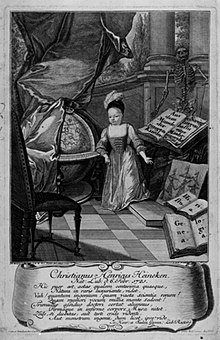|
Christian Heinrich Heineken  Christian Heinrich Heineken or Heinecken (February 6, 1721 – June 27, 1725), also known as "the infant scholar of Lübeck", was a German child prodigy who lived only to the age of four. LifeHe was born in the Prince-Bishopric of Lübeck, Germany, the son of Paul Heinecken (1674–1746), a painter and architect, and Catharina Elisabeth Heinecken (1683–1757), an artist and alchemist.[1][2] His brother, Carl Heinrich von Heineken, became an art historian and collector and was later knighted.[2] It is said that when he was ten months old, he could speak German. He read the Pentateuch at age one,[1] and between the ages of two and three, he read the Old and New Testaments in Latin.[1] When he was three years old, he was said to have recited his own History of Denmark when visiting the King of Denmark.[1] Also at three, he testified in court concerning the murder of his friend, another boy named Reid.[1] He died at age four of celiac disease.[3] He was breastfed until close to his death, which was caused very likely by the ingestion of grain products.[4] While his exploits may seem difficult to believe, they are relatively well documented. In 1726, his tutor (a man named Schöneich) published a study of Christian entitled The Life, Deeds, Travels and Death of the Child of Lübeck.[1][5] Immanuel Kant, in his book Anthropology from a Pragmatic Point of View, cited Heineken as an "ingenium praecox" (someone "prematurely clever").[6] See alsoWikimedia Commons has media related to Christian Heinrich Heineken. References
Other sources
|
Portal di Ensiklopedia Dunia